
The Business of Fashion
Agenda-setting intelligence, analysis and advice for the global fashion community.

Agenda-setting intelligence, analysis and advice for the global fashion community.
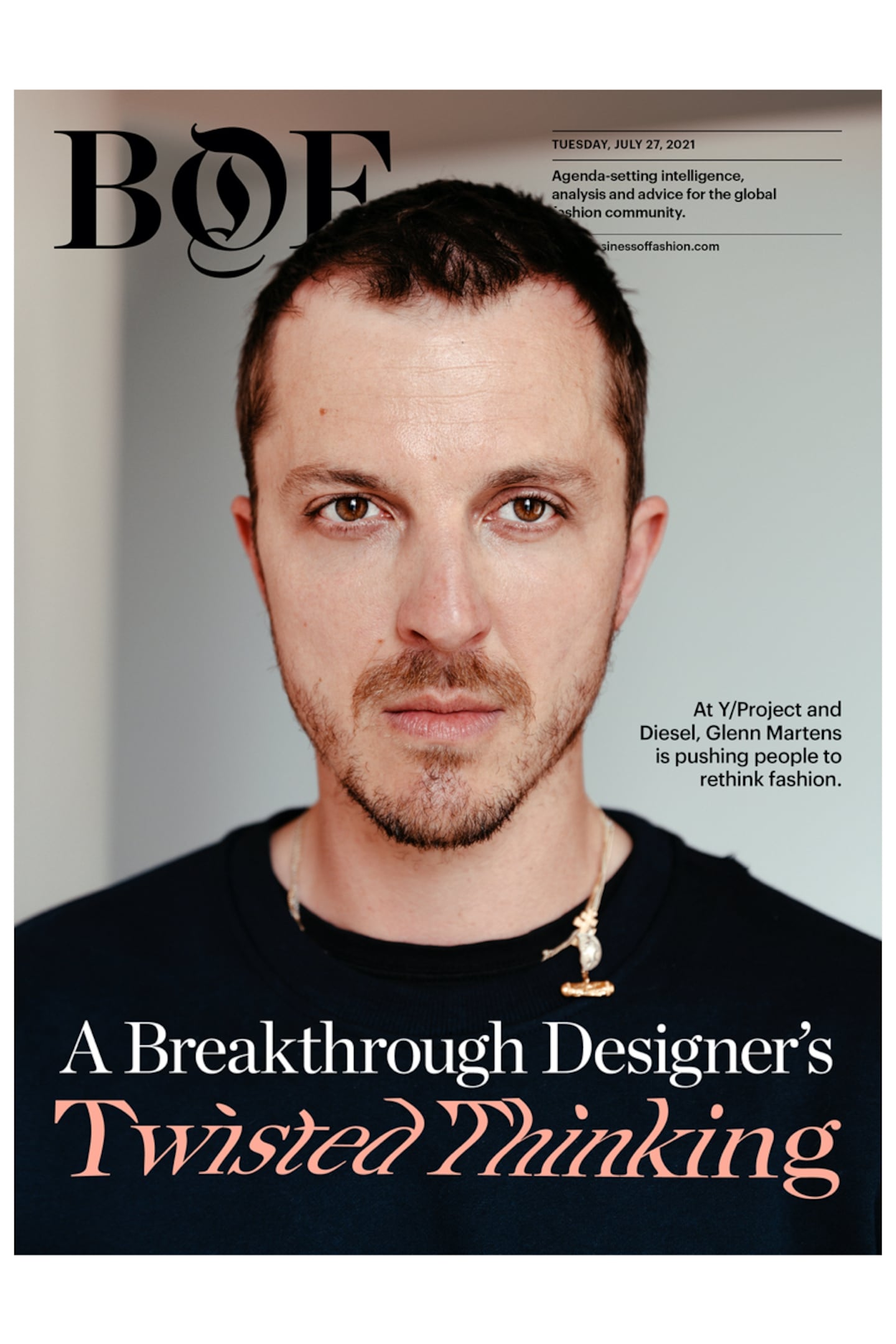
It’s been a good month for Glenn Martens. His first full collection as Diesel’s new creative director launched in Milan on June 21. Then, a week later in Paris, he showed his most accomplished collection yet for his own Paris-based label, Y/Project. When we spoke, he was the post-season picture of serenity.
Pre-season was a different story entirely. “For Y/Project, people know what I’m doing so it’s kind of like a continuous story. Diesel is, of course, a new thing and I think a lot of people were very sceptical about my position here. So, I was super-stressed about the public response.”
One major stress point for the designer — pointy, haunted-looking, you could imagine him playing Hamlet — was the creation of something he calls the Denim Library, a core collection of Diesel classics that will carry over from season to season. There will be less of the trendy washes and treatments of the past, as well as higher price points that will never be reduced. And there’s the rub: “I have no idea how my market is going to react to the fact that the Library, which is supposed to be 40 percent of our turnover by November, will be 10 to 15 percent more expensive,” Martens muses. “These are the type of garments which I’m filling 500 stores with, plus so many other points of sale. They are supposed to be produced in big numbers. And they’re supposed to be able to talk to a lot of different types of people, so of course the design factor is not as extreme. And they will never be out of stock.”
He laughs. Do I detect a little nervousness? “I mean, the sell-in was fantastic. Our buyers reacted extremely positively because the quality went up. And the message was more coherent. It linked well with the brand identity. It’s always a bit dependent on what you do with it, but I think the world is maybe ready for it.” Diesel, which has been trying to recapture its cool for more than a decade, is certainly betting on that.
ADVERTISEMENT
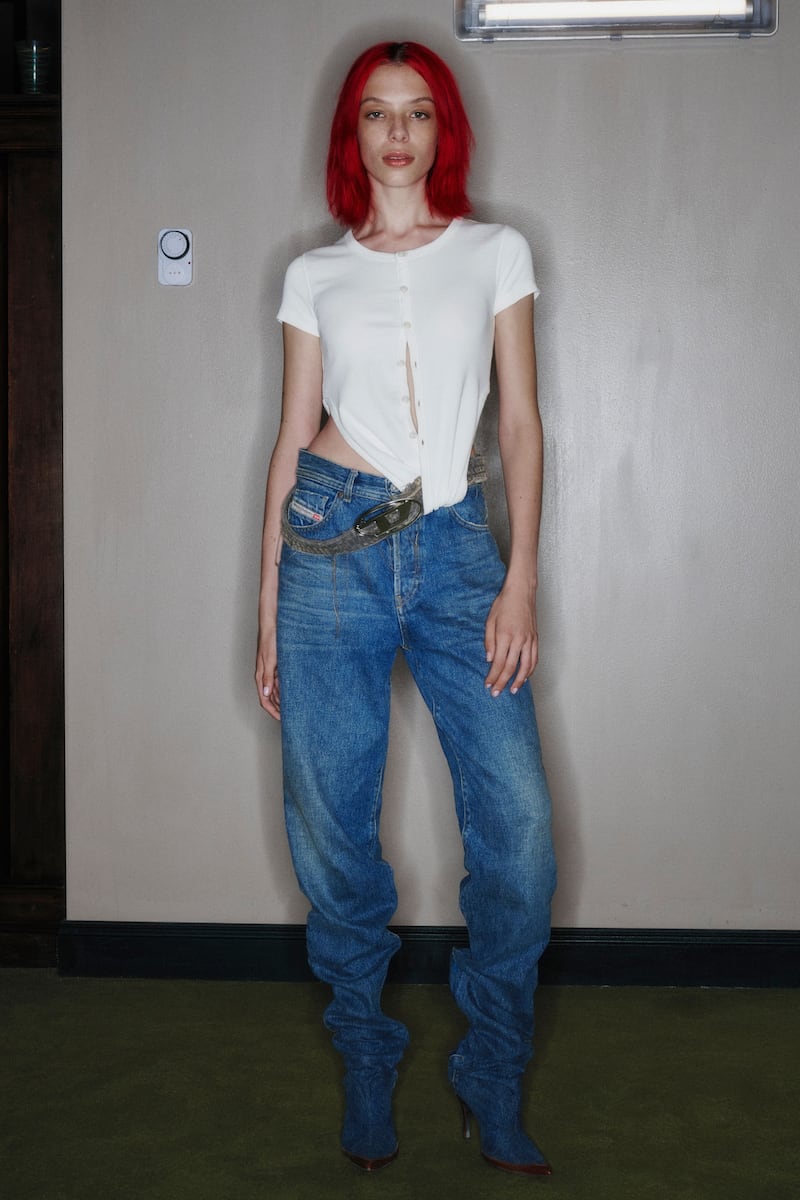
At Y/Project, on the other hand, there was no self-doubt. “At Y/P, there are 15 people in the studio and not one of them is a proper pattern maker, they’re all designers. On one side, that’s challenging because things will be slower, but it’s also quite refreshing because we do things in a more alternative way, making sure that we embrace mistakes, building them up in a less classic way, which can be very liberating as a designer.” In the past, that’s meant collections that were choked with ideas, many of them not fully realised because of the fashion calendar’s traditional time constraints. But the pandemic gave the team a precious six months to integrate a proper story across all the categories of the collection.
“It was just a bit more grown-up, a bit more adult,” says Martens. “There’s a coherence in silhouette. We didn’t have to force the looks because they were already there. But it’s as eclectic and as versatile as ever, maybe even more so. There’s not one garment which doesn’t have three ways of wearing it. They all have triple neck holes, they all have double panels, they can become as chaotic as you want, or you can make them a bit more clean and more controlled. That’s always been the concept of the brand, but this feels more coherent.”
We do things in a more alternative way, making sure that we embrace mistakes... which can be very liberating.
That versatility was actually the result of a budget issue with Marten’s first show for Y/Project when he became creative director eight years ago after the death of founder Yohan Serfaty. His CEO wanted a presentation, but his budget was a mere €15,000 ($17,600), so Martens designed the clothes to be worn in different ways. That gave him more bang for his buck: when the clothes came back out on the runway for a second time, the audience saw them as completely different looks. “That’s not the way I designed before Y/Project, but I thought it was actually kind of fun, and really exciting to think in this way about garments. Now it’s just a trademark of the brand.”
Like his film for the Winter 2021/2022 collection, Martens’ digital presentation for Y/Project’s latest collection used the stark economy of Lars Von Trier’s Dogville as a template. Lines drawn out on the studio floor represented buildings and houses, the models followed the lines like a community going about their day. If it was surreally impactful when Von Trier used it, it was scarcely less so at Y/Project. And the fact that the narrative Martens created was so character-driven grounded the occasional tricksiness of the clothes.
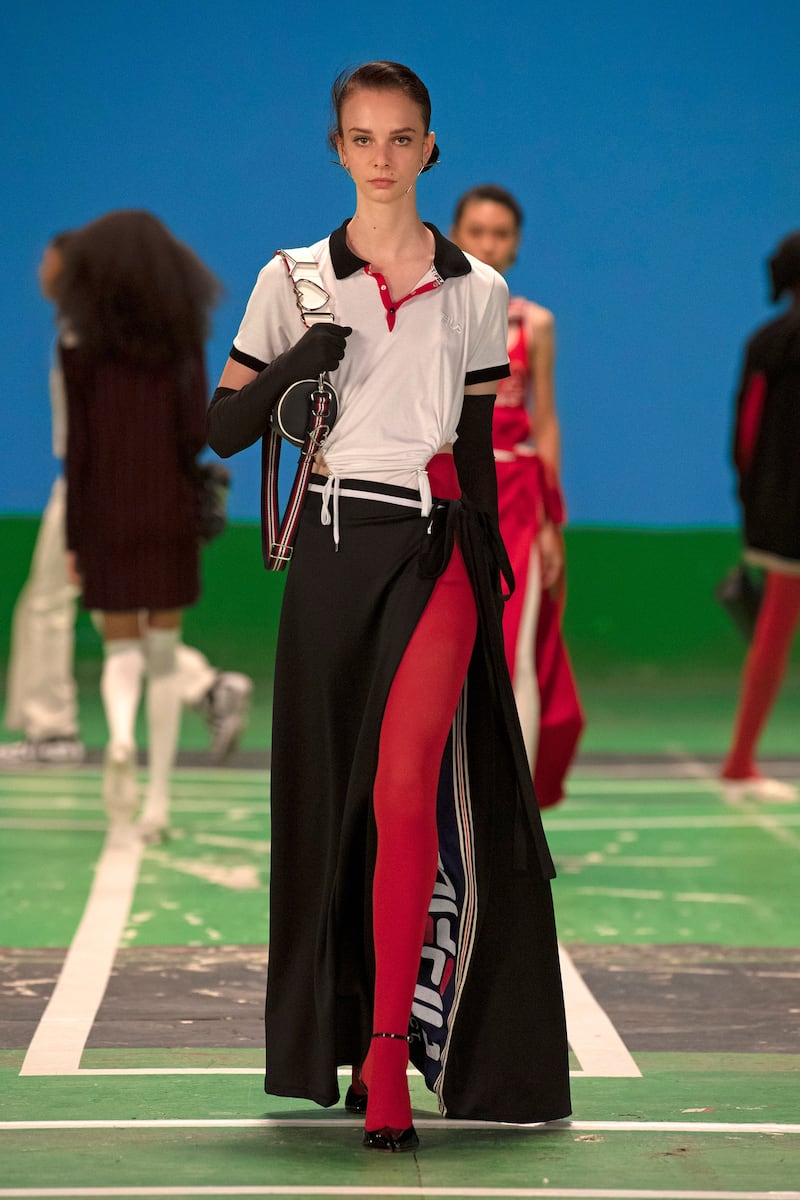
“I know when people come to see our runway, they’re often having some kind of stroke after the fourth look. They’re wondering what the fuck is happening. They don’t understand it. That’s also because we always embraced looks which were maybe not supposed to be very beautiful or aesthetic. Some of our looks are really just there for the sake of having fun and going quite far with experimentation. I really enjoy these challenges, but I understand that they sometimes appall people, so with the virtual fashion show, what I can do is really focus on the detail that I want to focus on and guide the viewer to what I feel is important. You can’t have that control in a physical fashion show.”
And yet Martens claims he’s old-fashioned enough to see a return to physical fashion shows in his future. “With a real show the models are there, you dress them, make them pretty, put them on the catwalk and three hours later you’re already kind of drunk with your team, celebrating. I think I’m gonna go back to a show because I really love the engagement, the excitement, a little bit more adrenaline, and drama… a bit of fashion drama, that’s what we all like.”
But that’s not the whole story. When it became clear last year how the pandemic was going to impact the industry, The Business of Fashion launched Rewiring Fashion, a forum for independent designers and retailers navigating their way through the Covid nightmare to share advice and push for change to the fashion system. Martens was instantly on board with an impressively detailed “solution to protect creativity, artistry, craftsmanship, innovation, beauty, preciousness… basically the fashion we fell in love with, which is the type of fashion we see disappearing.” He saw a radical opportunity to challenge the industry’s hidebound orthodoxies, foremost among them the illogical tyranny of the fashion calendar.
I don’t feel the industry is going to change... you’re kind of obliged to follow the domination of the bigger houses.
“I don’t feel the industry is going to change anyway,” Martens says 14 months later. “Besides, as an independent designer, you’re kind of obliged to follow the domination of the bigger houses, so if LVMH and Kering want to do fashion week, I kind of have to do it too.” And if and when the full calendar is reactivated, he feels that, without “the classic fashion show,” he’ll be at a disadvantage with buyers and media. Last year, Y/Project made a video explaining how to wear its garments, highlighting their versatility. “People loved that and actually I loved doing it also because you could really explain the garments and go into details,” says Martens. “But I’m sure that if I would do that next year when there is a full fashion week again, people won’t give a fuck about it.”
ADVERTISEMENT
He’s not bitter, he’s just pragmatic. And that’s something he learned early. His father is a judge. If ever young Glenn wanted anything, his dad expected him to prepare a case for his request. “I really had to have a grounded way of thinking and speaking before coming to him to ask if I could go to Disneyland, for example.” The persuasive power of reason has carried into Martens’ work in fashion. It’s the old one-for-them-one-for-me rationale. “It’s always about finding the balance, isn’t it? If I make nice T-shirts, nice denims which sell well, my CEO at Y/P will be happy. And the same thing happens at Diesel. As long as I make sure that they have bestsellers, they will let me do whatever I want to do next to them.” By that, he means something like the artisanal capsule he created for Diesel, which he describes as “the craziest things, which were completely against the way of thinking for a globalised brand that is normally focused on fast fashion, because everything was extra-slow.”
But contrariness is actually as much in Diesel’s genes as it is in Martens’. If its jeans weren’t ground-breaking, the brand’s mode of communication certainly was. The sensational “For Successful Living” which ran throughout the Nineties being just one example of Diesel’s ability to gloss its product with controversy. “That is the most amazing thing about this brand,” Martens marvels. “They were making fun of themselves, making fun of the industry, when they talked about things like plastic surgery. But they were also talking about social issues, minority rights, gay rights, and the like.” He picked up on that instantly with his Christmas campaign for a collection that was already designed when he arrived. He linked it to the separations of the pandemic, focusing on eight different couples — different ages, races, sexualities — who had, at some point in their relationships, been unable to be together. “It was actually more a documentary than a campaign, really normalising every single type of love.” Martens says. “The amount of followers we lost was absurd, but for me it was very important because it was my very first statement for the company.”
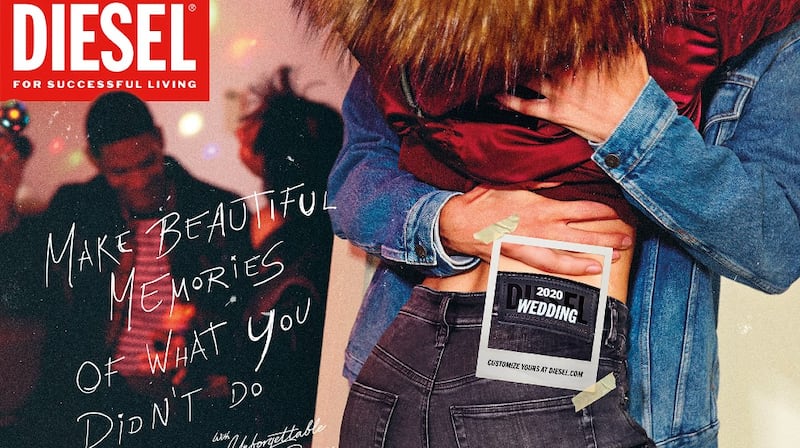
He claims the intense reaction worried Diesel founder Renzo Rosso. “But he was also very excited because he knows I’m being as radical as he used to be in the past,” Martens continues. “Of course I’m listening to the markets and whatever…” He pauses for effect, then bursts out laughing, “…but actually I’m not really listening to them. I think I have the maturity to understand what’s needed, to know how to play the game. It does mean we’re very aware we’re going to lose customers, but if we can make the brand sexy and hyped, we bring them back. And we definitely find new ones. That’s also part of the game.”
“I think everybody knows I was negotiating other contracts for houses which were much more luxury-orientated simultaneously when I was negotiating Diesel,” says Martens. “And I think one of the reasons why I went to Diesel was because I could actually have a bigger message than just being aesthetic. People all over the world, regardless of what money they make, or what religion they have, or what views, they relate to Diesel.” That insight was reinforced by his three-month lockdown last year. “I think most people were in a garden or whatever but I was shut in my apartment in Paris, walking against the walls, just thinking, ‘Okay, what is important in my life?’ And at a certain point, continuing to work in a very purely artistic way was not really what mattered the most to me. I felt like working for a brand which has more power, which could really help the world more than just making another pretty dress.”
Which isn’t to say that Martens isn’t fulfilled by Y/Project. “I can do whatever I want as the head of this company. I can do the most crazy experimental pieces, and people finally really engaged with it. They love it, they respect it, so I don’t even have to stress about the fact that it’s never going to sell or whatever. But there wasn’t really a point for me to do the same kind of exercise. This is definitely what I hope for me, and maybe designer fashion. It would be fantastic if things become a bit more personal.”
I felt like working for a brand which has more power, which could really help the world more than just making another pretty dress.
Ultimately, one thing that stands out about Martens is his own sanguinity in the face of anything the unpredictable present can throw at him. “I hear that the biggest luxury groups are once again hiring hip hoppers and whoever to create collections. Does it really matter? It doesn’t, because denim brands are hiring me. It all depends on the way of working. And there’s also a lot of attention now towards really creative young designers. I think people are going a bit more to that again. Hopefully we’re going through a shift where integrity and creativity are pushed, and independence is respected.”
“We are all independent designers who propose luxury products,” Martens wrote in his manifesto for Rewiring Fashion. “We have different ways of expressing ourselves, we have a different voice to create our own luxury. Some are about beauty, some are about concept, some are about craftsmanship…” What he felt everyone had in common was “exclusivity.” It seems typical of what I’m beginning to think of as his appetite for contradiction that he describes Y/Project as “not always the most precious garments; when you have these distorted garments, it doesn’t really matter how you wear them or don’t wear them.” Exclusivity and unpreciousness in one package? When I suggest to Martens that such mastery of ambiguity is something he shares with his Belgian peers, the idea temporarily throws him for a loop. “It’s part of how I see my life,” he counters. “I’m trying to be a person who’s extremely comfortable in all situations. I’m 38 but I’ve experienced quite a lot of different things in my life. I think that also reflects back on the way I design.”
Martens graduated from college in Bruges, Belgium, with a degree in interior architecture. Then, with no fashion background whatsoever, applied for the fashion programme at the Royal Academy of Fine Arts in Antwerp. “I am very much obsessed with beauty and history,” he rationalises. One of his favourite words is opulence. “As a child, I would spend my days drawing kings and queens and I would really accent their clothes. I did have this aesthetic idea of how a garment implements and changes your personality. Glamour was something I really loved, and the whole mystery, the drama, the beauty around it.” That much is obvious in the fantastic historical echoes in his collections: velvet cloaks and Elizabethan armour, poet blouses, princess sleeves, arcane whorls of fabric, all mixed up with Canada Goose or this season’s fabulous Fila collab.
ADVERTISEMENT
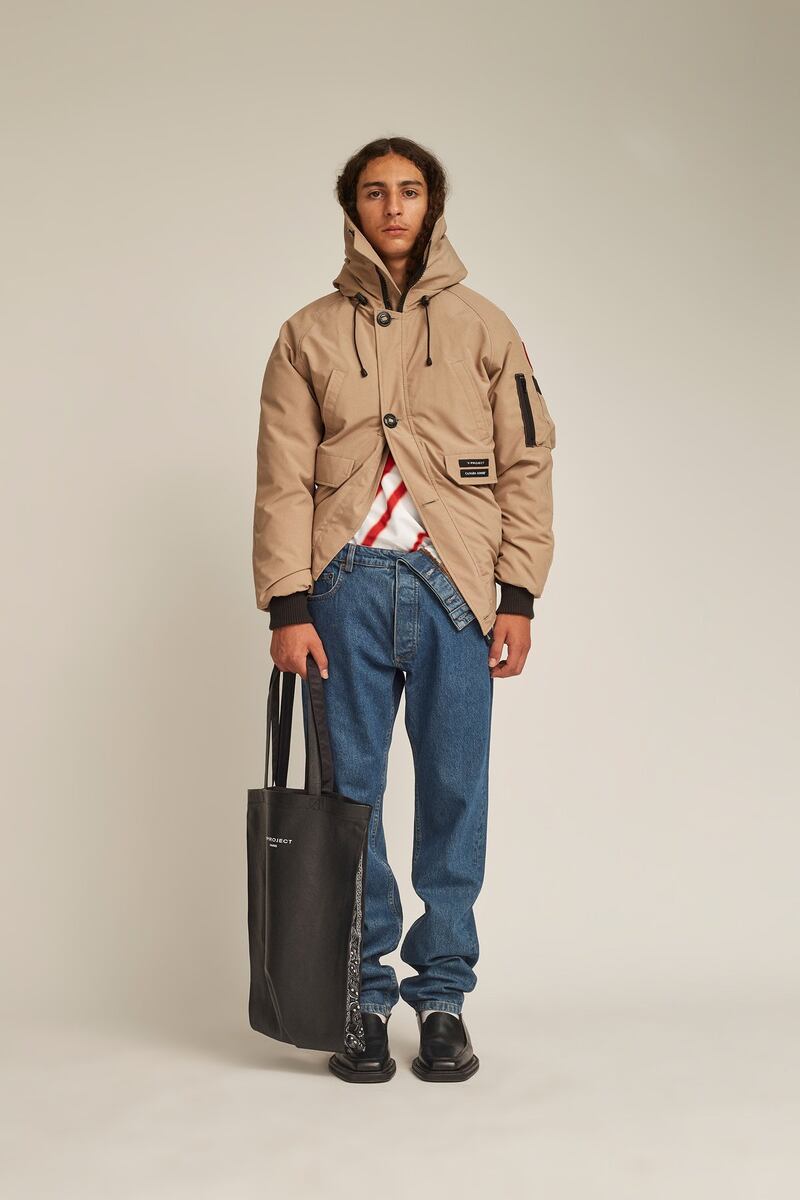
But when Martens showed up for his entrance exam at the Academy, he brought a portfolio of chairs and closets. Counter-intuitive, to say the least. “I don’t know how they accepted me. I was really not prepared. I really went more as an experience and as a challenge to see how it was.” Afterwards, his friend Bruno Pieters told him that every year’s intake included a couple of applicants who had model-type bodies, because the students had to use each other as fit models to get ahead in class. “In those days I was still a good size, so I think that was maybe why I was accepted at the beginning. And I did spend four years at the Academy modelling for my classmates.” But Martens also fell in love instantly with the school, even if, as he once claimed, Walter van Beirendonck, the formidable head of fashion, almost drove him to the brink of a nervous breakdown. “We had very different ways of expressing ourselves artistically so I was definitely not among his favourites,” he says discreetly. “But it was mind-blowing when you entered as a simple little Flemish person from Bruges. My dad is in law, my mother is a nurse, nothing really wild or creative or very experimental in my genes. We’re not a flamboyant people. And then you end up there. I had to learn everything from scratch, at a level which is extremely high. It’s a pain in the ass, but it’s cool, and I think that’s why I learned my craft so fast. I mean, it’s like a Cinderella story. Like a fairy tale.”
The story of the Academy is also the fairy tale of Belgian fashion. The variety of influential fashion voices that it has produced is second only to Central Saint Martins in London. “In Belgium, you really have to find the beauty in the unexpected, it’s not like it’s a given,” Martens suggests. “And that’s what connects a lot of Belgian designers. Dries is for me the prototype of a designer. When I was a student, we did a master class with him and he was always saying that his starting point is the thing that he doesn’t like, which he then tries to turn into something that he likes. I think that’s exactly what I do also, with both Diesel and Y/Project. How can we turn the tackiness of the brand into something that is more sophisticated and cute? Sometimes it’s playing on the verge of taste. But I think it’s really nice to engage with what you think is a bit more difficult to accept and actually make it beautiful. Sometimes you just completely miss and it becomes even worse, as has happened quite a lot to me in the past at Y/Project. But it’s just part of the game.”
I like to give clothes which have no answer.
“What I always wanted to push for with Y/P was that I really wanted people to question themselves when they buy things,” Martens declares. “The fashion industry’s maybe a little bit more consumption-oriented than before. I wasn’t really there twenty years ago but I feel like there was Phoebe Philo and Ghesquière and Alber Elbaz and Galliano and all these crazy beautiful artistic worlds and you felt like digging into those worlds and deeper into those clothes. Today it’s based on Instagram and people are really just consuming the visual and it doesn’t go as deep. I’m not saying I’m as good as those designers I listed, but I do think that with Y/P I’m definitely trying to create that view of the world. And on top of that, I also try to push people to think about it again.”
“I like to give clothes which have no answer,” Martens adds. “Obviously you can try to find the answer in the runway collections and the styling, but basically when you get the clothes, or when you order them online and they arrive, you really have to discover them yourself. You have to try them out and really engage with them and you actually have to ask yourself the question — I hope people do — how do I actually like to wear this pullover? Instead of just wearing a hoodie with a big logo on it. It’s the whole integrity of how we started. And it’s taken seven years for people to understand it really well.”
Related Articles:
Brands from Valentino to Prada and start-ups like Pulco Studios are vying to cash in on the racket sport’s aspirational aesthetic and affluent fanbase.
The fashion giant has been working with advisers to study possibilities for the Marc Jacobs brand after being approached by suitors.
A runway show at corporate headquarters underscored how the brand’s nearly decade-long quest to elevate its image — and prices — is finally paying off.
Mining company Anglo American is considering offloading its storied diamond unit. It won’t be an easy sell.